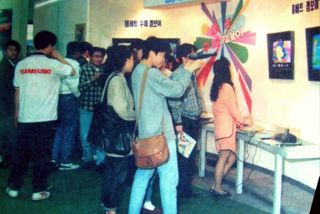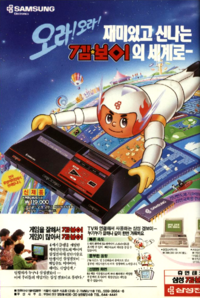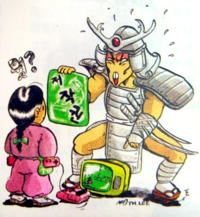History of Sega in South Korea
From Sega Retro

|
| History of Sega in South Korea |
|---|
| Official Sega distributor(s): HiCom (1988-1999), Korea OACS (1988-1993?), Samsung (1988-1997), Kama Entertainment (1997-1998), Korea Data Systems (1997-1998), Hyundai-Sega Entertainment (1996-2001), Sega Korea (2003-2008), Sega Publishing Korea (2008-present) |
This short article is in need of work. You can help Sega Retro by adding to it.
South Korea has and continues to see a number of Sega products imported into the country, in addition to producing its own hardware and software for Sega systems.
Contents
Arcade era/MSX compatibles
Section under construction
Sega Mark III

From November 1988, Korea Oacs and HiCom with help from Samsung was selling Sega Mark III and planed to produce 50,000 units in 1989[1], but plan was cut shortly in April 1989.
Samsung
Gam*Boy
Most of Sega's home consoles were distributed in South Korea by Samsung. The names were changed because the Japanese products were illegal in this region. In April 1989, Samsung began selling Sega Master System as Gam * Boy[2]. The console was supported by Korea Oacs and HiCom, which released software. Despite the failure in rest of Asia, was pretty popular in South Korea selling 720,000 units until 1993 and last model was released in 1995. From May 1990, Samsung began promoting Mega Drive as Super Gam*Boy. The system had good sells, having 200,000 holders until 1993. Game Gear released in January 1991 as Handy Gam * Boy doesn't had that much of luck due to price and was beaten by stronger competition.
Aladdin Boy
In late 1992, Samsung decided to change the names of the consoles to Aladdin Boy (Master System), Super Aladdin Boy (Mega Drive) and Handy Aladdin Boy (Game Gear). CD Aladdin Boy (Mega CD) sold from March 1993 and Super 32X (Sega 32X) from January 1995, weren't received good by the public.
In 1994, Sega Digital Communications announced the launch of Sega Channel within a year, however, it is not known today whether this happened.
Samsung began marketing the Sega Pico as Pico from March 1995 and Sega Saturn as Samsung Saturn from November 1995. The 32-bit console had the most expensive launch price in South Korean history reaching W550,000 and selling only 2,000 units in the first month. Saturn was incompatible with Japanese version and limited number of games in Korea resulted that most of the people decided to buy cheaper Japanese consoles and some of the retailers began selling regional converters[3]. As an answer, on Summer 1996 Samsung released cheaper model with bundled converter. Unlike its predecessors, third-party companies like Wooyoung System translated a few games into Korean, starting from 1996[4]. In February 1997, after poor Saturn sales, Samsung exited the gaming business. Due to popularity of Pico in the country, Samsung kept a rights to the distribution in South Korea, releasing even a new model in 1998. They eventually ended production in December 2002.
Sega Saturn and Mega Drive 2
In September 1997, Sega Saturn returned this time under its original name (restrictions about selling Japanese products were abolished at the time). The distributors were Kama Entertainment and Korea Data Systems (KDS)[5][6]furthermore, Wooyoung System returned to translating Saturn games. Some of the titles released by Samsung have been re-released.
From the same time, HiCom began distributing the Mega Drive 2 in South Korea, under its original name. Like Saturn, some of the Mega Drive games were released for the second time.
Hyundai
In 1996 Sega formed a partnership with Hyundai, creating Hyundai-Sega Entertainment to bring arcade games and components to the country. The move was expected to produce $25 million USD in revenue for the two companies[7].
Soon, Hyundai decided to release Sega games on PC. In 1998, the company announced that it will become the distributor of the new Sega Dreamcast console. In late 1999, it was promised that the console would be available in early 2000 but the system was still not released. In May 2000, it was decided that the consoles will be imported in unchanged Japanese version. The 25,000 units were sent to Korea before Hyundai cancelled the project in September 2000. It is unknown if someone later sold Dreamcast in Korea[8]. Sega.com Asia planned to launch localized internet service for Dreamcast until in early 2001, but it's fate is unknown[9].
Piracy
As in other Asian countries, piracy also existed in South Korea and one example are famiclones. As for Sega, games for the Master System have been pirated since the early 1990s. During Samsung's distribution, the Mega Drive bootlegs weren't as that common. Everything changed in the late 1990s and early 2000s when many clones were released including Car Game, GamBrothers by First Game, Megagame by Phillko, Dream X by Mega Game, Neo-16, Sponge by Techline, Noritul FX-16 and Super Drive by Unitech and TV Pump by Mega Game (which also created rare Korean bootleg for MD called Pump It Up).
Xity Enterprise
From 2003, Xity Enterprise began to market Kids Communication Pico in Korea as Neo Pico.
Present days
The companies that distributed Sega PC titles in late 1990s and early 2000s are SKC and Wizard Soft[10]. Sonokong released some of the titles in mid-2000s. In 2013, Shanda Games released Chain Chronicles[11].
Since 2003, Sega Korea replaced in 2008 by Sega Publishing Korea is the representative of Sega.
In 2010s, Sega created Sega Asia which handle regional releases of games,[12] but not physical distribution.
External links
- A History of Korean Gaming article by Sam Derboo at Hardcore Gaming 101
References
- ↑ https://archive.ph/rIyg5
- ↑ http://www.hardcoregaming101.net/korea/part1/korea1.htm#fn59b
- ↑ http://www.hardcoregaming101.net/korea/part2/korea2.htm
- ↑ File:GameChamp_KR_1996-10.pdf, page 29
- ↑ File:GameChamp_KR_1997-10.pdf, page 11
- ↑ File:GameChamp_KR_1997-11.pdf, page 2
- ↑ Ultra Game Players, "March 1997" (US; 1997-02-25), page 16
- ↑ http://www.hardcoregaming101.net/korea/part2/korea2.htm
- ↑ https://web.archive.org/web/20010208231942/http://www.sega.com.hk/b5/aboutsega/press3.htm
- ↑ https://web.archive.org/web/20010407222202/http://wzsoft.com:80/english/pd.html
- ↑ https://www.techinasia.com/sega-hopes-to-take-chain-chronicles-across-asia-via-an-unexpected-partner
- ↑ https://www.siliconera.com/sega-established-singapore-branch-to-cover-southeast-asia/
